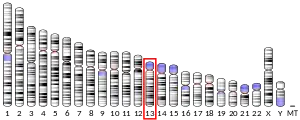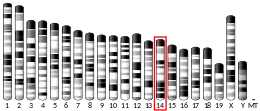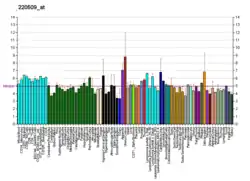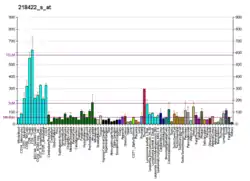RBM26
RNA-binding protein 26 is a protein that in humans is encoded by the RBM26 gene.[5][6][7]
| RBM26 | |||||||||||||||||||||||||
|---|---|---|---|---|---|---|---|---|---|---|---|---|---|---|---|---|---|---|---|---|---|---|---|---|---|
| Identifiers | |||||||||||||||||||||||||
| Aliases | RBM26, ARRS2, C13orf10, PPP1R132, SE70-2, ZC3H17, PRO1777, RNA binding motif protein 26 | ||||||||||||||||||||||||
| External IDs | MGI: 1921463 HomoloGene: 41468 GeneCards: RBM26 | ||||||||||||||||||||||||
| |||||||||||||||||||||||||
| |||||||||||||||||||||||||
| |||||||||||||||||||||||||
| |||||||||||||||||||||||||
| Orthologs | |||||||||||||||||||||||||
| Species | Human | Mouse | |||||||||||||||||||||||
| Entrez | |||||||||||||||||||||||||
| Ensembl | |||||||||||||||||||||||||
| UniProt | |||||||||||||||||||||||||
| RefSeq (mRNA) | |||||||||||||||||||||||||
| RefSeq (protein) | |||||||||||||||||||||||||
| Location (UCSC) | Chr 13: 79.31 – 79.41 Mb | Chr 14: 105.11 – 105.18 Mb | |||||||||||||||||||||||
| PubMed search | [3] | [4] | |||||||||||||||||||||||
| Wikidata | |||||||||||||||||||||||||
| |||||||||||||||||||||||||
References
- GRCh38: Ensembl release 89: ENSG00000139746 - Ensembl, May 2017
- GRCm38: Ensembl release 89: ENSMUSG00000022119 - Ensembl, May 2017
- "Human PubMed Reference:". National Center for Biotechnology Information, U.S. National Library of Medicine.
- "Mouse PubMed Reference:". National Center for Biotechnology Information, U.S. National Library of Medicine.
- Eichmuller S, Usener D, Dummer R, Stein A, Thiel D, Schadendorf D (Mar 2001). "Serological detection of cutaneous T-cell lymphoma-associated antigens". Proc Natl Acad Sci U S A. 98 (2): 629–34. doi:10.1073/pnas.021386498. PMC 14639. PMID 11149944.
- Kavanagh SJ, Schulz TC, Davey P, Claudianos C, Russell C, Rathjen PD (Mar 2005). "A family of RS domain proteins with novel subcellular localization and trafficking". Nucleic Acids Res. 33 (4): 1309–22. doi:10.1093/nar/gki269. PMC 552957. PMID 15741184.
- "Entrez Gene: RBM26 RNA binding motif protein 26".
Further reading
- Olsen JV, Blagoev B, Gnad F, et al. (2006). "Global, in vivo, and site-specific phosphorylation dynamics in signaling networks". Cell. 127 (3): 635–48. doi:10.1016/j.cell.2006.09.026. PMID 17081983.
- Beausoleil SA, Villén J, Gerber SA, et al. (2006). "A probability-based approach for high-throughput protein phosphorylation analysis and site localization". Nat. Biotechnol. 24 (10): 1285–92. doi:10.1038/nbt1240. PMID 16964243.
- Gerhard DS, Wagner L, Feingold EA, et al. (2004). "The status, quality, and expansion of the NIH full-length cDNA project: the Mammalian Gene Collection (MGC)". Genome Res. 14 (10B): 2121–7. doi:10.1101/gr.2596504. PMC 528928. PMID 15489334.
- Dunham A, Matthews LH, Burton J, et al. (2004). "The DNA sequence and analysis of human chromosome 13". Nature. 428 (6982): 522–8. doi:10.1038/nature02379. PMC 2665288. PMID 15057823.
- Ota T, Suzuki Y, Nishikawa T, et al. (2004). "Complete sequencing and characterization of 21,243 full-length human cDNAs". Nat. Genet. 36 (1): 40–5. doi:10.1038/ng1285. PMID 14702039.
- Strausberg RL, Feingold EA, Grouse LH, et al. (2003). "Generation and initial analysis of more than 15,000 full-length human and mouse cDNA sequences". Proc. Natl. Acad. Sci. U.S.A. 99 (26): 16899–903. doi:10.1073/pnas.242603899. PMC 139241. PMID 12477932.
This article is issued from Wikipedia. The text is licensed under Creative Commons - Attribution - Sharealike. Additional terms may apply for the media files.





